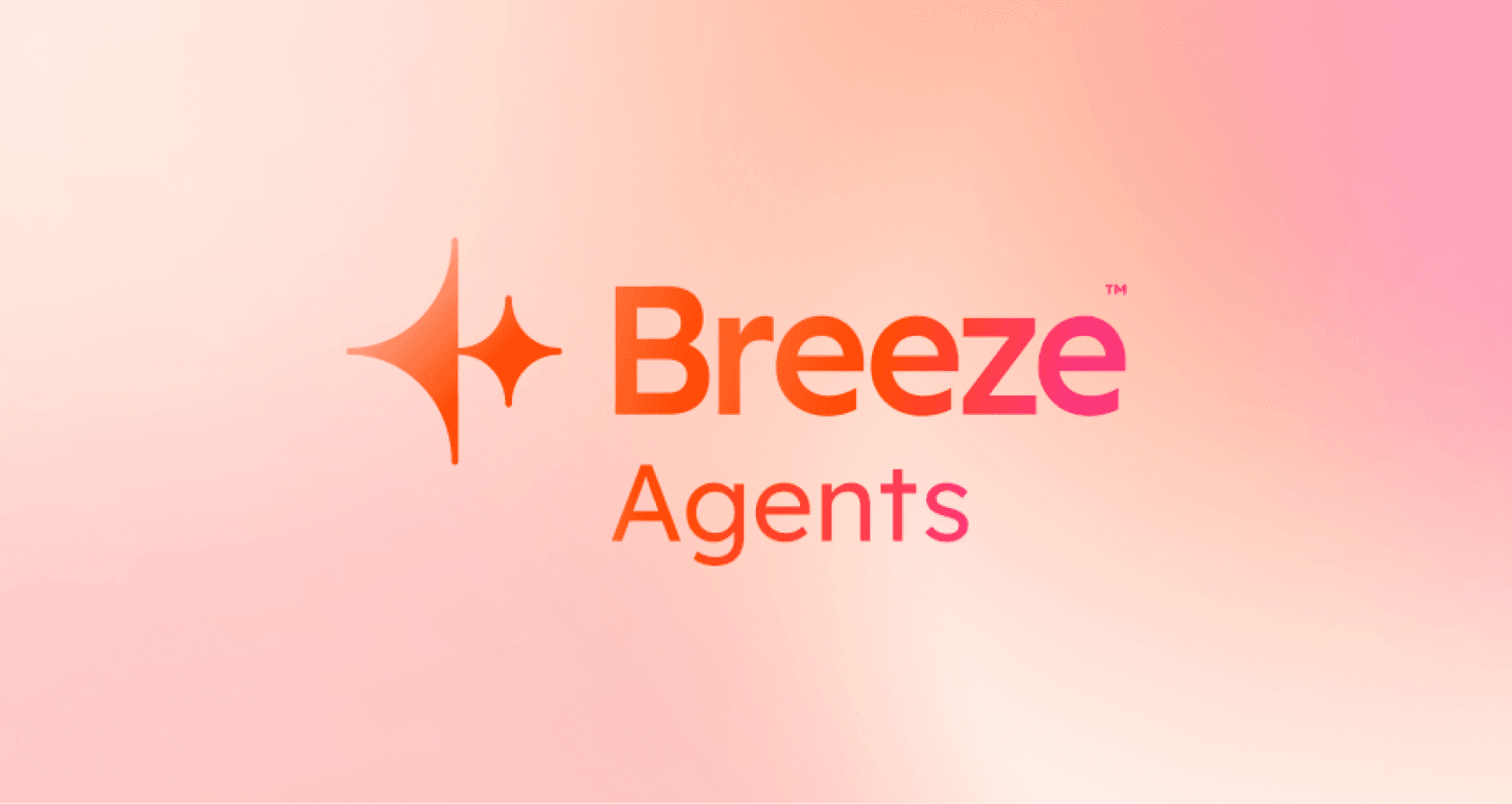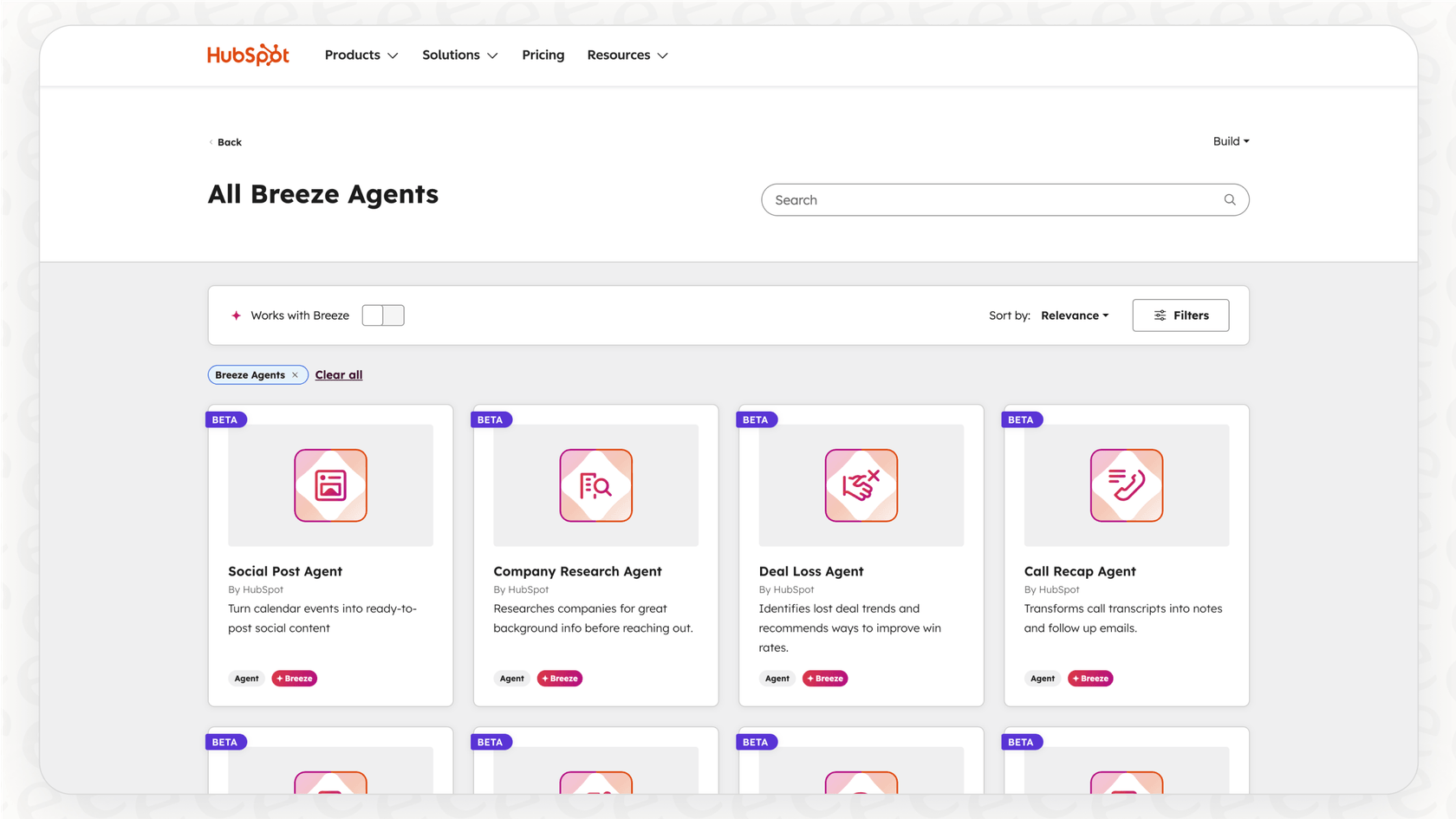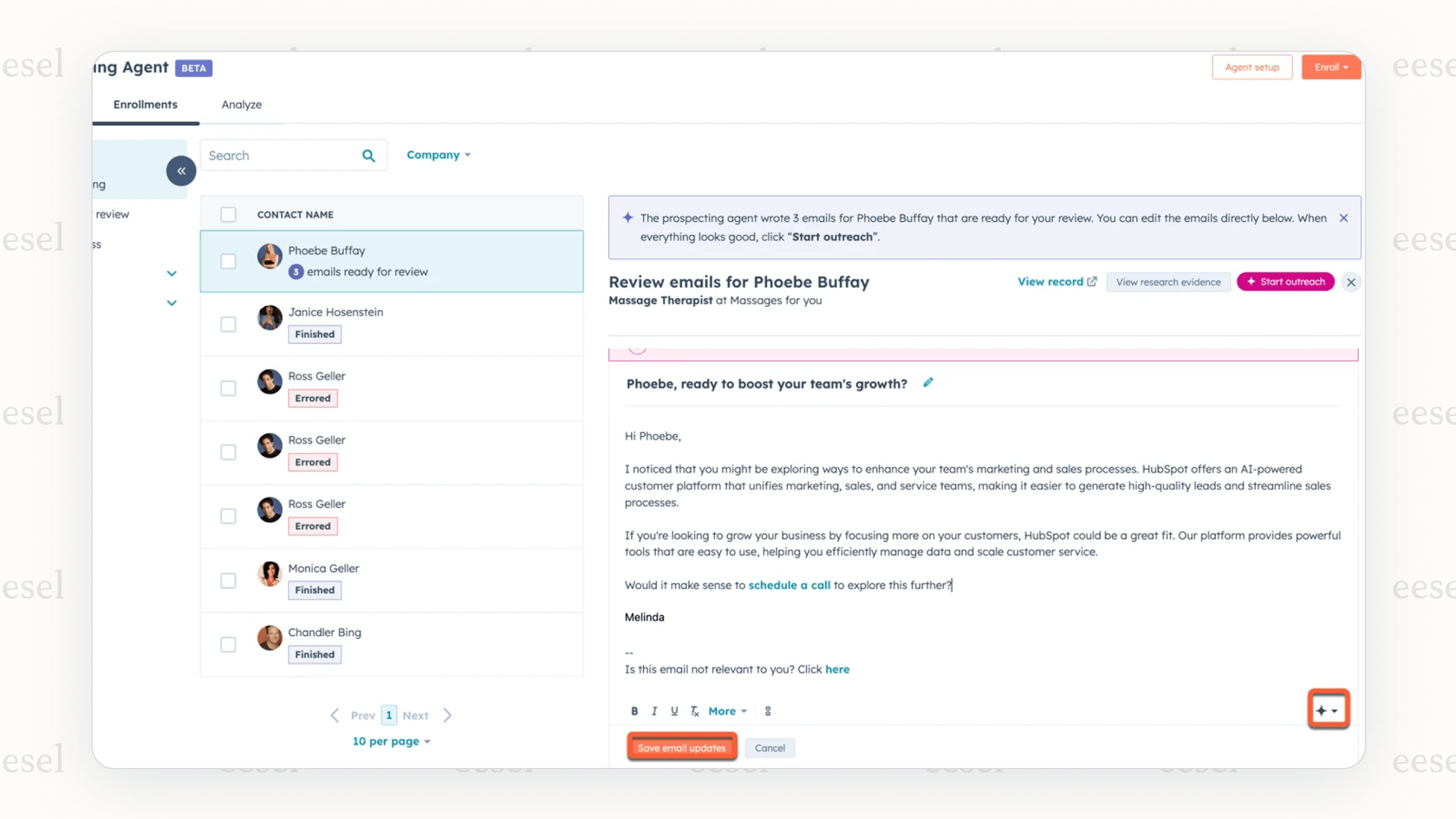
Let's be real, everyone is talking about AI automation. And honestly, it makes sense. Teams are looking for better ways to deal with repetitive tasks that take up time in marketing, sales, and support. HubSpot's impressive answer to this is a set of tools they call Breeze agents.
But first, a quick heads-up. If you Google "Breeze," you might see a project management tool or even a map from the game Valorant. This article isn't about those. We’re zeroing in on HubSpot's AI tools to give you the full story: what Breeze agents are, what they do, and how they can power your business growth in 2026.
We'll also look at another option for teams who want to add extra AI power alongside their existing systems.
What are HubSpot Breeze agents?
So, what exactly are HubSpot Breeze agents? They're a collection of AI tools built right into the HubSpot platform. It helps to think of them as specialized digital teammates. These aren't just basic chatbots; they're designed to handle entire workflows from start to finish, helping your team focus on high-value work.

Because they live inside HubSpot, they tap into all the customer data in your CRM, which provides incredible context for every interaction. The main agents they offer are:
-
Content Agent
-
Prospecting Agent
-
Customer Agent
-
Knowledge Base Agent

This tight integration is a major benefit, as it ensures your AI is always aligned with your central database.
A look at the different Breeze agents
Each of the Breeze agents is built for a specific job, and each one is integrated into HubSpot's professional Hubs. This structure allows you to access a comprehensive suite of tools tailored to your specific department's needs.
The Content Agent
What it does: The Content Agent is part of HubSpot's Content Hub. It helps you draft blog posts, landing pages, and other marketing materials by analyzing your existing content and CRM data to mimic your brand's voice.
Use cases: It is a powerful tool for marketing teams looking to scale their content production or maintain consistency in their inbound marketing efforts.
Considerations: The agent is highly optimized for the HubSpot ecosystem. If your company has information across different platforms like Confluence or Google Docs, the Content Agent primarily focuses on what's within HubSpot.
A complementary approach: To give your AI even more context, a tool like eesel AI can work alongside HubSpot. It plugs into various knowledge sources, from Google Docs and Confluence to Notion. This allows you to leverage all your company's data, providing a great way to enhance the content your agents produce.

The Prospecting Agent
What it does: This agent is designed for automating sales outreach. It researches contacts within your HubSpot CRM and writes personalized email sequences to help start the conversation.
Use cases: It's a significant time-saver for sales teams trying to scale their prospecting, helping them focus on closing deals rather than manual outreach.
Considerations: This agent focuses on the data available within your HubSpot CRM. For teams that need to pull in real-time data from external services like Shopify during the outreach process, you might look at additional automation tools.
A complementary approach: If you need your AI to take action across multiple platforms, eesel AI offers customizable "AI Actions." This can connect to other services to pull live data, like order history or account status, making it a great partner for your HubSpot prospecting efforts.
The Customer Agent
What it does: The Customer Agent is a sophisticated AI chatbot for your website. It's trained on your HubSpot knowledge base to give customers quick, accurate answers.
Use cases: It's perfect for handling simple, repetitive support questions 24/7, which allows your human agents to focus on complex customer needs.
Considerations: This agent is the gold standard for teams that use HubSpot Service Hub as their primary help desk. If your team currently uses another specialized tool like Zendesk, Freshdesk, or Intercom, you would typically use HubSpot's extensive migration tools to get the most out of it.
A complementary approach: If you want to keep your current help desk while still getting advanced AI capabilities, the AI Agent from eesel AI is a fantastic option. It features one-click setups for Zendesk, Freshdesk, and other platforms, allowing you to run a smart AI agent within your existing workflow.

The Knowledge Base Agent
What it does: This agent works with the Customer Agent to identify gaps in your documentation. It reviews tickets to see common questions and drafts new help articles to address them.
Use cases: It’s an efficient way to keep your help center up to date, boosting self-service and ensuring your documentation reflects current customer needs.
Considerations: This agent is seamlessly integrated with HubSpot's knowledge base. For teams that use other platforms like Notion or Confluence for their documentation, the drafts stay within HubSpot.
A complementary approach: eesel AI also offers the ability to suggest draft articles based on resolved tickets. It can save these drafts across various platforms, helping you maintain a unified knowledge base regardless of where your team works.
The benefits of a unified platform: Setup and integration
Getting started with Breeze agents is a strategic commitment to HubSpot's Professional or Enterprise plans. This investment provides your team with a highly integrated and mature ecosystem.
The biggest advantage here is centralization. When your marketing, sales, and service teams all run on HubSpot, you get a "single source of truth." Everything is in one place, which makes coordination across departments much smoother.
While these tools are part of a larger ecosystem, HubSpot offers a robust and reliable platform that thousands of companies trust to power their customer service. The annual plans ensure that you have a stable, enterprise-grade environment to grow your business throughout 2026.

HubSpot Breeze agents: Pricing explained
Breeze agents are part of HubSpot's tiered plan structure. This means you aren't just buying an AI tool: you're investing in a comprehensive suite of business solutions.
This model provides great value by bundling many features together. Here are the starting prices for the professional-grade annual plans. These plans are designed to scale with you as your team grows.
| HubSpot Hub | Professional Plan (Starts at) | Enterprise Plan (Starts at) |
|---|---|---|
| Marketing Hub | $800 / month (billed annually) | $3,600 / month (billed annually) |
| Sales Hub | $450 / month (billed annually) | $1,500 / month (billed annually) |
| Service Hub | $450 / month (billed annually) | $1,500 / month (billed annually) |
This bundled approach ensures that you have access to HubSpot's full range of reliable, mature features.
For teams looking for a specialized AI layer to add to their existing stack, platforms like eesel AI offer clear, predictable pricing. With plans starting at $239/month (billed annually), it's a great complementary option to keep your costs predictable as you scale your support volume.

Are Breeze agents right for you?
For companies that are already utilizing the HubSpot ecosystem, Breeze agents are a powerful way to add automation. They are built to work beautifully within that specific, trusted environment.
If your business uses a wide variety of different tools and you aren't ready to move everything to a single platform, you might consider a more flexible AI solution to complement your current setup.
Looking for a flexible AI solution to complement your setup?
If you want AI that works across all your favorite tools, eesel AI is designed to be a versatile addition to your tech stack. It’s a smart AI layer that enhances the tools you already use.
Here’s how eesel AI can help:
-
Fast setup: Connect to your existing tools in minutes. It's designed to be approachable and easy to implement.
-
Complete control: Use our workflow builder to decide which tickets the AI handles. You can start small and scale as you grow.
-
Centralize your knowledge: Train your AI on tickets, help center articles, and docs from Confluence or Google Docs.
-
Simulation mode: See your expected resolution rate and cost savings before you go live.
-
Predictable pricing: Straightforward plans with no hidden fees, helping you manage your budget effectively.
Ready to see how a flexible AI agent can support your team alongside HubSpot? Start your free eesel AI trial today or book a demo with our team.
Frequently asked questions
Breeze agents are a collection of AI tools built directly into the HubSpot platform, designed to automate workflows in marketing, sales, and customer support. They act as specialized digital teammates, leveraging customer data within your CRM.
Yes, each agent is designed to work seamlessly within HubSpot's specific "Hubs" (e.g., Content Hub, Sales Hub, Service Hub), meaning they are part of the professional software package they come with to ensure deep integration.
Breeze agents are incredibly powerful for teams already on HubSpot. They work best when your data is centralized within the HubSpot ecosystem, and they provide a unified experience for marketing, sales, and service operations.
Breeze agents are included within HubSpot's Professional or Enterprise plans for the respective Hubs. This tiered pricing provides a comprehensive suite of tools, ensuring you have everything you need to scale your business operations.
For businesses that run their entire operation on HubSpot, Breeze agents are an excellent choice. If you use a wide variety of external tools, you might also consider complementary AI solutions that integrate across different platforms.
Breeze agents are experts at accessing information stored within your HubSpot CRM and knowledge base. This allows them to provide highly relevant responses based on your internal HubSpot data.
Breeze agents are part of the HubSpot Professional and Enterprise tiers. To see their full potential, you can work with HubSpot's team to understand how they integrate into your specific business processes as part of their comprehensive annual plans.
Share this post

Article by
Stevia Putri
Stevia Putri is a marketing generalist at eesel AI, where she helps turn powerful AI tools into stories that resonate. She’s driven by curiosity, clarity, and the human side of technology.







